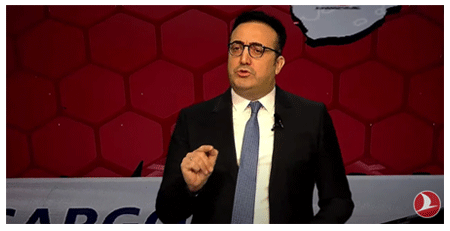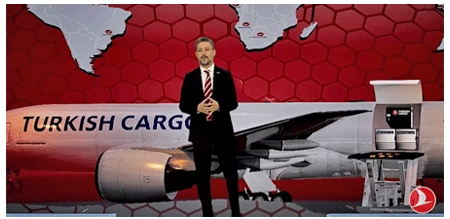

#INTHEAIREVERYWHERE
 |
 #INTHEAIREVERYWHERE |
| Vol. 20 No. 6 | Tuesday
February
16, 2021 |
Did
Turkish Cargo Webinar Work? |
Last week Turkish Cargo Talks, a three-hour webinar went out worldwide. We watched it. Here is our take. The event opened with about five minutes from host Smilin' Sam Chui. Chui is a reality star who flies around and eats dinner in first class on everybody’s airline and shares the experience with his large global audience living vicariously every mile aloft. After Smilin' Sam’s debut chat, he reappeared introducing the sessions between various speakers and at times seemed somewhat surprised at what he was learning about air cargo.  Turkish Airlines CEO Ilker Ayci in person
introduced Turkish Airlines’ Cargo Talks webinar by providing perfectly
relevant numbers, both hopeful and proud. There was talk about Turkish Cargo
building an impressive new handling facility, and carrying 40 million shots
of vaccine so far and also the cargo business becoming a separate company.
Not much about what the new company really means, but I guess this will
become clearer in time. I was struck by the CEO’s statement that THY
had not laid off any member of their staff in 2020, despite the pandemic.
Turkish airlines was said to have reached 6th cargo operators rank in 2020
and aims to reach a place among the first three. Lots of pictures and graphs
and time for the naughty viewers to check their mail or have a drink, as
the opening took longer than other webinars.
Turkish Airlines CEO Ilker Ayci in person
introduced Turkish Airlines’ Cargo Talks webinar by providing perfectly
relevant numbers, both hopeful and proud. There was talk about Turkish Cargo
building an impressive new handling facility, and carrying 40 million shots
of vaccine so far and also the cargo business becoming a separate company.
Not much about what the new company really means, but I guess this will
become clearer in time. I was struck by the CEO’s statement that THY
had not laid off any member of their staff in 2020, despite the pandemic.
Turkish airlines was said to have reached 6th cargo operators rank in 2020
and aims to reach a place among the first three. Lots of pictures and graphs
and time for the naughty viewers to check their mail or have a drink, as
the opening took longer than other webinars. This one followed an ascending path, with CEO Ayci’s declared intention
to “find novel ways to cooperate”, supplemented by Turkish Airlines
Chief Cargo Officer Turhan Özen’s additional and quite optimistic
figures. We all know how successful Turkish has been in recent years; in
contrast I watched and wondered, why are we not talking about what air cargo
might do to accelerate less suffering in the world? If we did, could it
actually do it, or would it just be wishful thinking in this case? The rich
presentation provided by Pharma Aero’s van Gelder gave us a clear
idea of the complexity of the logistics challenge. So that told me that
the acceleration was not a low hanging fruit. Patience is the virtue of
the strong.
This one followed an ascending path, with CEO Ayci’s declared intention
to “find novel ways to cooperate”, supplemented by Turkish Airlines
Chief Cargo Officer Turhan Özen’s additional and quite optimistic
figures. We all know how successful Turkish has been in recent years; in
contrast I watched and wondered, why are we not talking about what air cargo
might do to accelerate less suffering in the world? If we did, could it
actually do it, or would it just be wishful thinking in this case? The rich
presentation provided by Pharma Aero’s van Gelder gave us a clear
idea of the complexity of the logistics challenge. So that told me that
the acceleration was not a low hanging fruit. Patience is the virtue of
the strong. After MOC Chui’s intermission, we were served a first panel discussion about the future of air cargo, trying to settle on a 2030-2040 outlook that remained a bit unfathomable. Asia, in particular China, was expected to take front stage in the world trade and grow faster than others, and perhaps one could argue that this is the present rather than the future. All agreed that issues with capacity and prices will continue unless a game changer appears on stage. I was hoping for a greater difference in the opinions, but I was not going to find it. Where were the dissenters, the people who are not satisfied, with the status-quo who might take off the gloves and reveal a different plan; create some breakthrough thinking? Maybe in the second panel. Most of us are in a battle for survival when it comes to making a living, or most recently being safe and keeping ourselves and loved ones alive and well during the global pandemic. The stylish webinar, which was perfectly organized both at technical and visual level, was sailing at a distance from the pressure. The Turkish Airlines webinar on February 10 was trying to convey a message that remained technical and dispassionate. Most speakers were Dutch native-speaker males, perhaps this contributed to the absence of argument. It felt strangely disconnected to reality as these well-meaning individuals floated their theories and experiences. Issues such as the rise of e-commerce could have taken a smaller share of limelight in this world of 2021 turned upside down, but both panels took a more socially distanced approach. I think I shouted at the screen a couple times, everyone knows I am passionate about airlines, airfreight in particular and the hardly sociable period did not dampen my instincts. So I lit the fire and poured an adult beverage. I continued listening to the second panel which dealt with the issue of digitization of air cargo. Lining up IATA, Agility, Champs and Freightos and other professionals, the discussion was more passionate and intriguing: how do we change our mind from digitizing paper documents to creating the right environment for data sharing. One could argue that it is surprising it has not happened yet, but the takeaway was that the pandemic has indeed worked as an accelerator in the process. So my original question on how can we make things happen faster was gaining momentum. This being said, even this panel was run at a noticeable level of concord and there were no killer questions asked. Why are we no longer able to bring divergent views to the table to heat things up? As in many other aspects of life, we seem to have developed an aversion to any form of disagreement. Is it really necessary to be so immaculately polite to truly advance air cargo? Cargo Talks by Turkish Cargo was a promising, expensive looking, slickly produced, semi-advertorial featuring more than a few participants with expertise that could have raised many more questions. It was a big production with a big set with big graphics and big models of cargo aircraft and a full-sized MC and some of the best people from Turkish Airlines. What was small were the images of the people on the screen. Little postage stamps of talking heads arranged six on the screen in that flat slightly out of focus fashion of this early generation of computer-to-computer meetings reminiscent of what we have seen in family and business interaction via this medium so far. I miss the talks at the bar, where you can really ask a nasty question and get an even nastier answer and still make progress. Some day we will dial up snazzy backgrounds adding some rippling motion themes behind these people just like the news anchors on television when we are meeting in this fashion, I thought. I guess we can all stay tuned for more about that.
|
If
You Missed Any Of The Previous 3 Issues Of FlyingTypers Access complete issue by clicking on issue icon or Access specific articles by clicking on article title |
||
 Vol. 20 No. 3 Take a Tip from the Tulips Chuckles for January 24, 2021 Petal to the Metal LH Cargo FRA Facility Revamp |
|
|
Publisher-Geoffrey Arend
• Managing Editor-Flossie Arend • Editor Emeritus-Richard
Malkin Film Editor-Ralph Arend • Special Assignments-Sabiha Arend, Emily Arend |
Send comments and news to geoffrey@aircargonews.com
|